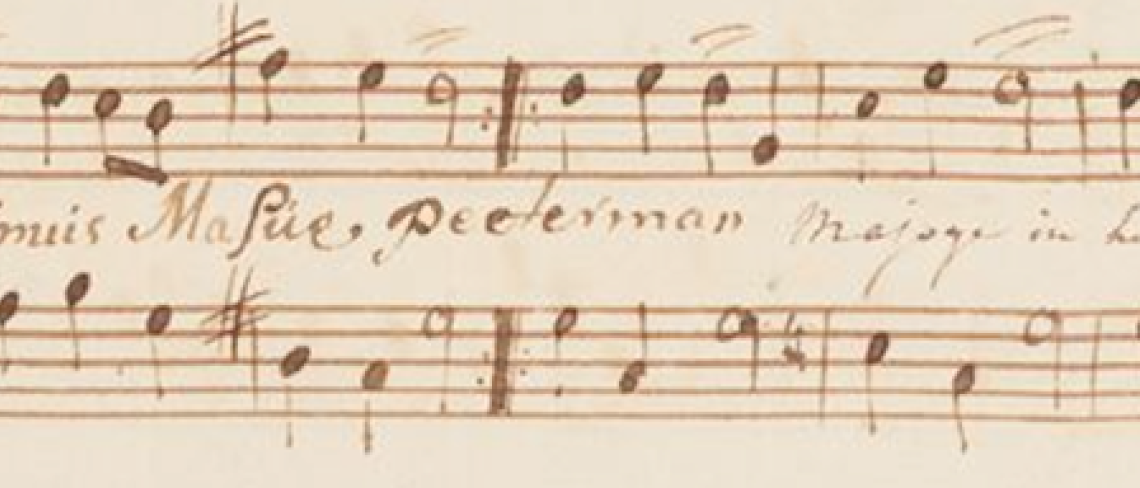In honour of 600 years of KU Leuven, the music of the old university has returned to the city's carillons. A short version of the same tune is being played on the half-hour mark on the Peace Carillon at Park Abbey.
Music plays a important role at KU Leuven, whether in concerts with the Leuven University Choir or in a convivial setting during a cantus. Even at the time of the ancient university, music was ubiquitous.
Primus celebrations
This was certainly the case during the annual primus celebrations. Every year between 1429 and 1797, the university organised the primus celebrations, a big competition in which the best three students from each of the four pedagogies competed. The winner, the primus, was honoured extensively, both in Leuven and back home.
These celebrations included special music performed by city musicians and the carillonneur of St Peter's Church. Seven of these songs are preserved in the Leuven Carillon Manuscript dating back to 1756-1761. This manuscript also contains the Cantilena Falconis, the club song of pedagogy De Valk. The manuscript was acquired by the Leuven University Archives in 1989 and has been accessible online in the Alamire Foundation's IDEM database since 2024.
The music of the old university has returned to the city's carillons.
During this year of celebration, Leuven can enjoy listening to a piece of history every month! One of the primus songs will sound as an hourly melody on the chimes of the Great Beguinage, Arenberg Castle, Vlierbeek Abbey and Park Abbey's Peace Carillon. At the half-hour mark, you’ll hear a short version of the same melody. Thus, the music of the old university will return to the soundscape of Leuven.
Every month a different soundscape
February - March: aria for Primus Majoye (1724)
Leuven native Carel Antonius Majoye became primus of the university on 14 November 1724. Then, he continued his studies in both aspects of law. He became a professor of canon law and was appointed president of Winckelius College, where he died at the age of 35.
April: aria for Primus De Cock (1732)
Leuven native Jacob Nicolas de Cock became primus of the university on 18 November 1732. He continued his studies in law before pursuing a career as a member of the Council of Brabant and the Secret Council.
May 2025: aria for Primus Boets (1742)
Leuven native Petrus Boets became primus of the university on 13 November 1742. He continued his studies in both aspects of law and became a professor of civil law at the university. He died at the early age of 34.
June 2025: March for Primus Wellens (1745)
Antwerp resident Jacob Thomas Wellens studied at pedagogy De Valk and became primus of the university on 16 November 1745. He then obtained a licence in theology and both law degrees. He became president of Hollands College and was appointed 17th bishop of Antwerp by Empress Maria Theresa in 1774.
July and August 2025: aria for Primus Wellens (1745)
After hearing a march for primus Jacob Wellens in June, we now hear an aria for the same primus. Is it a coincidence that it is for primus Wellens, who went on to have an important career, that two primus songs have been preserved?
September 2025: aria for Primus Sauvage (1744)
Joannes Petrus Sauvage was from Brussels, where his father was court painter at the Habsburg court. He became primus of the university on 17 November 1744. He then studied theology and both aspects of law and became a university professor.
October 2025: aria for Primus Vander Belen (1748)
Martinus Vander Belen was from Brussels and became primus of the university on 12 November 1748. He went on to study medicine and became a professor of anatomy and surgery. Shortly before his death, he became the personal physician to Prince de Salm-Salm, Duke of Hoogstraten.
November 2025: aria for Primus Lion (1760)
Guilielmus Henricus Lion was the son of the well-known Leuven watchmaker Alexander Lion. He became primus of the university on 21 October 1760. He became professor of pedagogy Het Castrum and died at the early age of 25.
December 2025: cantilena Falconis (Falcon Song)
Several club or battle songs of the De Valk pedagogy from the 18th century are still known. Those songs were performed during primus celebrations at the old university, among others. The version played is known thanks to the Leuven Carillon Manuscript of 1756-1760.
January 2026: Cantilena Falconis (Falcon Song) - continued
To round off the university soundscape at the end of the anniversary year, in January Leuven's carillons will play the rest of the Falcon Song, the beginning of which could be heard on the bells in December.
Practical details


